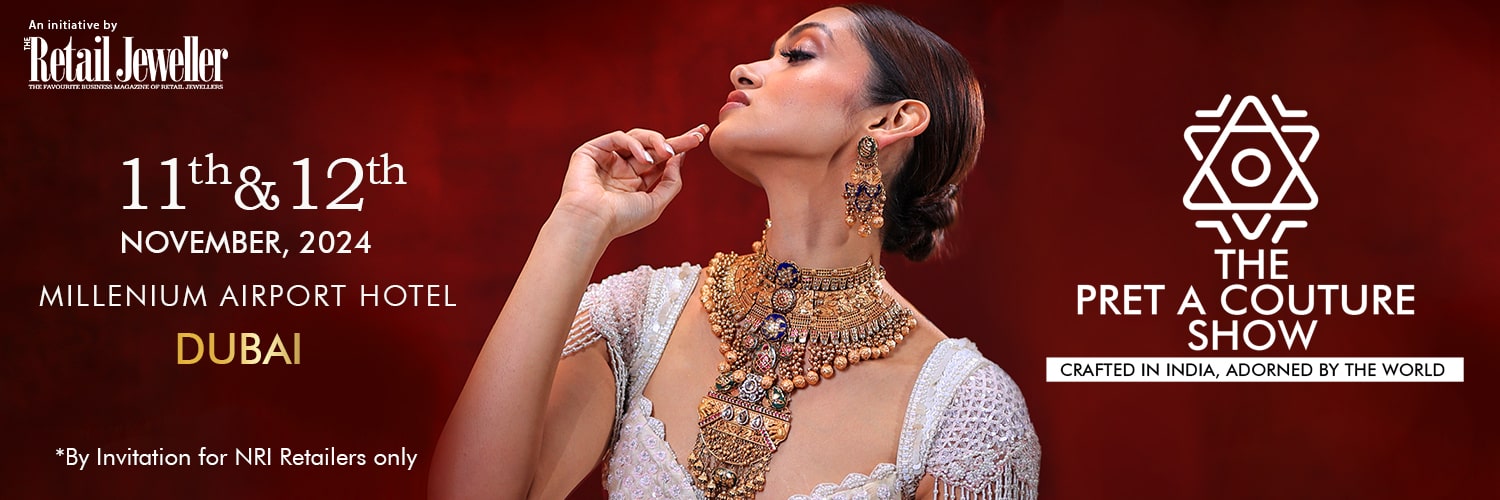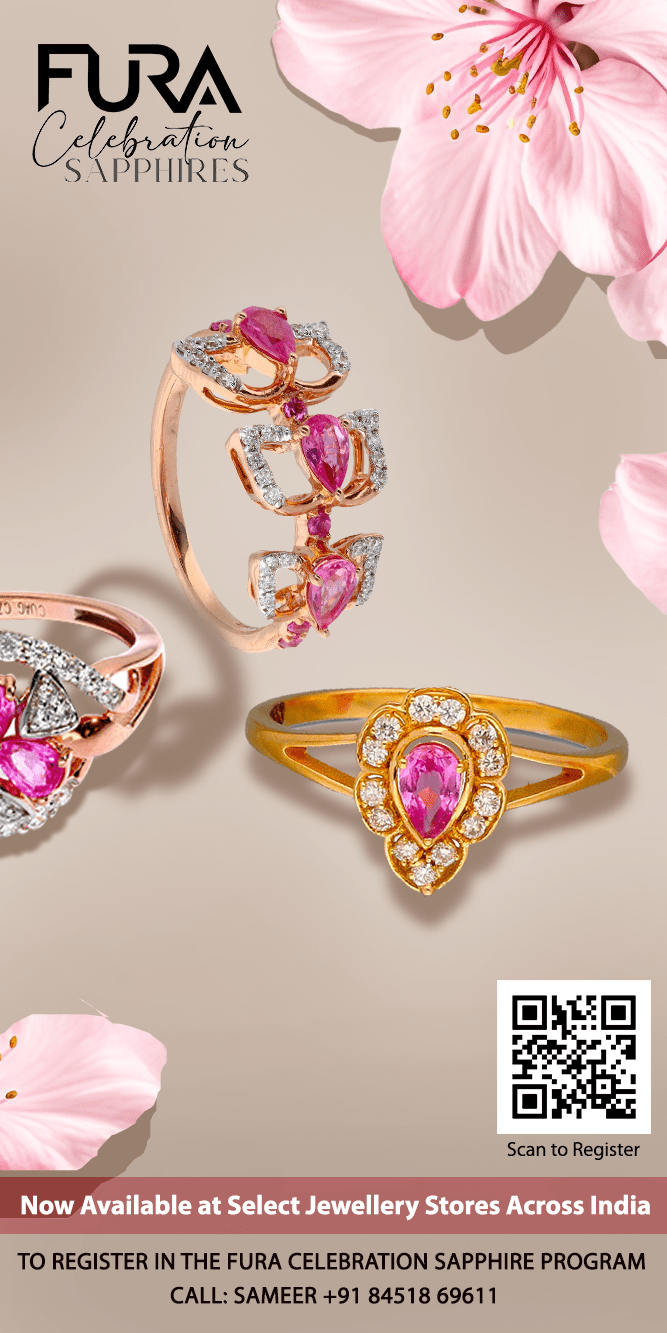RJ Market Watch
We are not worried about losing the plank of purity. The perceived premium of Tanishq vis-à-vis that of an established family jeweller goes significantly beyond the single matter of purity

As long ago as the early 2000’s, Tanishq, the preeminent brand in organised jewellery retail, made known that gold purity standard in India is questionable. It equated purity with trust, winning over millions of customers. Will mandatory hallmarking erode that lead? Not so, Ajoy Chawla, CEO, Jewellery Division, Titan Company Limited, tells Soma Bhatta – trust is an edifice of many levels, and purity is only the first one.
Soma Bhatta (SB): What is Tanishq’s take on mandatory hallmarking?
Ajoy Chawla (AC): Tanishq welcomes mandatory hallmarking. It is a necessary regulation. At Tanishq we have had stringent purity-standard checks for over two and a half decades. Finally, the industry as a whole has to meet the same standards. It’s high time the consumers got assured purity, got what they are paying for. Mandatory hallmarking will be good for the industry.
SB: Will it change the dynamics of the business on the ground?
AC: The dynamics of the market will change, to a significant extent. My sense is, those who were compromising on purity under the garb of reduced making charges will now find themselves holding the short end of the stick. Now they will need to factor in the increased purity cost, by way of increasing the making charges.
[As a consequence,] consumers will now be able to [see the reasons for] the perceived premium of branded jewellers such as Tanishq. It will increase the value perception of the organised trade.
SB: Tanishq has done landmark campaigns such as the pure–impure campaign and the ‘check your gold purity’ campaign, as long ago as in early 2000’s. They increased customer trust in Tanishq. Over the years, as a side effect, however, they triggered misgivings in the consumer mind even about family jewellers who sold hallmarked jewellery. With purity and caratage standardised under the new rules, will the family jeweller now gain an edge?
AC: Trust has various planks. We are not worried about losing the plank of purity, as there are several other dimensions of trust; purity is the basic level.
First, Tanishq’s purity drive has substantiated the lingering suspicions that consumers have about the quality they are offered at family jewellers. Second, in the diamond category, where most consumers do not understand gem quality, we offer the highest level of grading and certification, assuring them quality.
Third, consumers like to maximise the return value at the time of exchange or resale. Jewellery is considered an asset ¬— this is our cultural reality. Our value assurance, at the time of exchange or resale, is robust. Our value deduction processes, in exchange policies, are run according to parameters that favour the consumer.
There is no ambiguity in terms of what the consumer will get back if she ever decides to return the product. She can trust us to give back most of the value of the jewellery, minus the making charge, in case of gold and diamond. There is complete transparency in net and gross weight. Cash-back is another rare facility.
Finally, there is trust in terms of a Covid-safe environment at the store. The vigour and tenacity with which we follow safety and sanitary protocols gives consumers a lot of trust in buying from us.
When you extend ‘trust’ to the aspect of design, Tanishq looks at a piece holistically. Our approach equally emphasizes aesthetics, quality and functionality. The result is that Tanishq appeals to customers across the country.
More broadly, the brand stands for positive change and progress. Our ethos of modernity resonates with the Indian woman who seeks to voice her opinion. That’s why she connects with the brand at a more intrinsic level.
From a practical perspective, we are a large chain and consumers know that we will continue to be around after they have bought from us. And they have the comfort of finding us in many locations.
All these factors together intensify customer confidence and brand stickiness. Thus, the perceived premium of Tanishq vis-à-vis that of an established family jeweller goes significantly beyond the single matter of purity. It includes all these facets of ‘trust’.
SB: What is your view on the benefits of the new Hallmarking Unique ID, or HUID?
AC: HUID enables complete transparency and traceability of the piece. It rules out any malpractice at any stage of the hallmarking process. Conceptually, it’s a good idea because without the close inspection that is part of HUID, hallmarking could be seen as just a stamp of approval. Without HUID there could well be misuse of hallmarking at the centres.
It also supports, in another way, the agenda of the government, which is to build a more transparent ecosystem for jewellery businesses to function within. With each piece uniquely marked, the government is building accountability for inventory from retailers.
We are not seen as a credible industry, a fact that may be depriving us grants and benefits offered to other industries. The government should be able to place more trust in the jewellers.
SB: Accepting HUID has been tough for the industry. Are the concerns reasonable?
AC: The issue the industry faces is operationalisation, because getting an HUID is a time-consuming, four-step process. At each stage the Bureau of Indian Standards [BIS] hallmarking centres have to feed data manually into a central database, after which they get a final HUID code. The process is not completely error-free. It has reduced efficiency.
We hope that the bandwidth of the servers used in the process is also improved. We are confident that BIS will try to automate the system and resolve the current capacity issues. Otherwise, the industry will face a significant inventory bottleneck.
Another concern, of inability to adapt so fast to the technology shift, is not really valid. As a country, we never could have reached this level of the digital economy if we were not technology-aware. The GST [goods and services tax] was transformational, and jewellers were able to tide over that.
SB: Has the HUID slowed down the system for even Tanishq?
AC: Every jeweller faces a challenge in this regard. BIS has formed an empowered committee, but work needs to be done on a war footing to resolve matters by August-end, for smooth trade in September and October.
Every jeweller has suffered cash losses due to the pandemic and can’t bear any more backlog. Retailers need timely delivery of inventory to be able to benefit from the festive season now.
Tanishq has had to increase its activity in the hallmarking centres, and we faced supply-related issues in July. The hallmarking centers are operating with only 10–20 per cent of their throughput now, as compared to pre-HUID times. They need to build speed and capacity as every piece below 2gm needs HUID.
SB: Several issues have been escalated to the authorities for clarification. Is Tanishq seeking any clarity from BIS as well?
AC: Tanishq doesn’t have any such clarity issues.
SB: Do you think the markets will consolidate and give a push to the growth of large, branded chain jewellers?
AC: I don’t think large chains stores have any such advantage. Personally, I think this organised-versus-unorganised jewellery framework is inappropriate. There is enough for everyone and opportunities are there in abundance. We don’t have to fight each other for share.
If you set aside growth through expansion by way of new locations, there is no reason why an independent jeweller cannot grow at the same pace as any of the branded chains.
You mentioned, earlier, that consumers do not fully trust even jewellers who are hallmarked. With mandatory hallmarking now, an independent jeweller has a better chance of earning customer goodwill with better customer service.
In fact, it should be easier for an independent jeweller now, because he or she interacts with customers directly, unlike the teams of staff at a chain store brand. There are organised, standalone retailers who have increased their market share because they resolved to serve their customers better. So, market share is an outcome of what you do. Growth is the reality. Every player can grow, in this market.
SB: What are Tanishq’s near-term growth projections?
AC: With Covid-19, all predictions have taken a back seat. We had a business plan signed off before the second wave, but now we are going quarter-to-quarter, even as the Indian trade wonders if the third wave will be the last one for the business. For now, the only horizon we are paying attention to is August to Diwali. One has to be agile, nimble and digitally savvy. Our focus is on solving, not selling. We want to be a solution-provider for our clients.
SB: What is Tanishq’s message to the trade at large, on the HUID?
AC: The government is serious about the HUID. It is here to stay. BIS and the Ministry of Consumer Affairs are clear that it is a must-have.
It may call for some changes in our approach —this may be a bitter pill to swallow, but it will lead to benefits for retailers, consumers and the industry.
Courtesy: Retail Jeweller India News Service





 Wide Angle4 weeks ago
Wide Angle4 weeks agoIndia has overtaken China to become second largest diamond market: De Beers CEO Al Cook

 Daily News1 month ago
Daily News1 month agoUS-based private equity firm Advent International to acquire Orra Fine Jewellery, say media reports

 Exclusive2 months ago
Exclusive2 months agoThe House of Rose debuts in Mumbai with a 21,000 sq. ft. experiential concept space showcasing fine jewellery and luxury watch brands

 Wide Angle1 month ago
Wide Angle1 month agoEminent jeweller Viren Bhagat sets up first global boutique in London’s Mayfair























